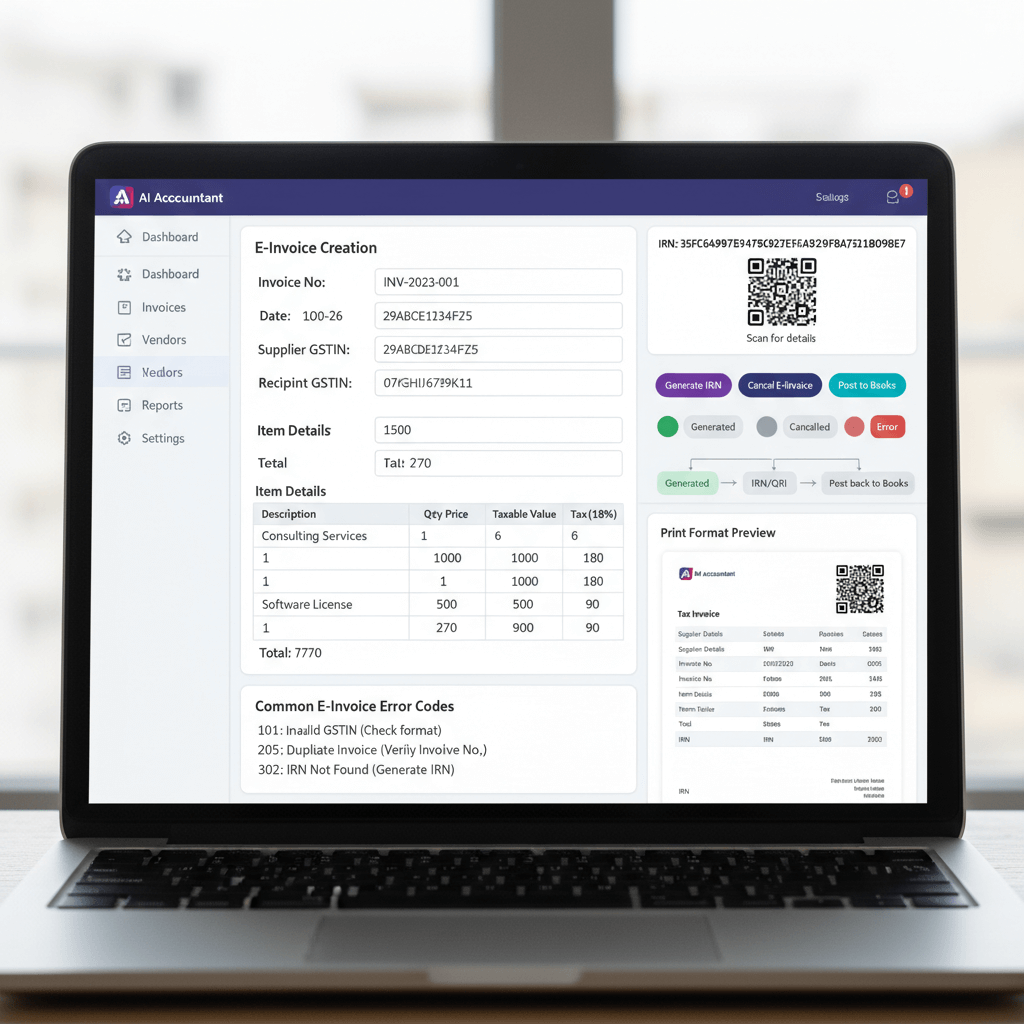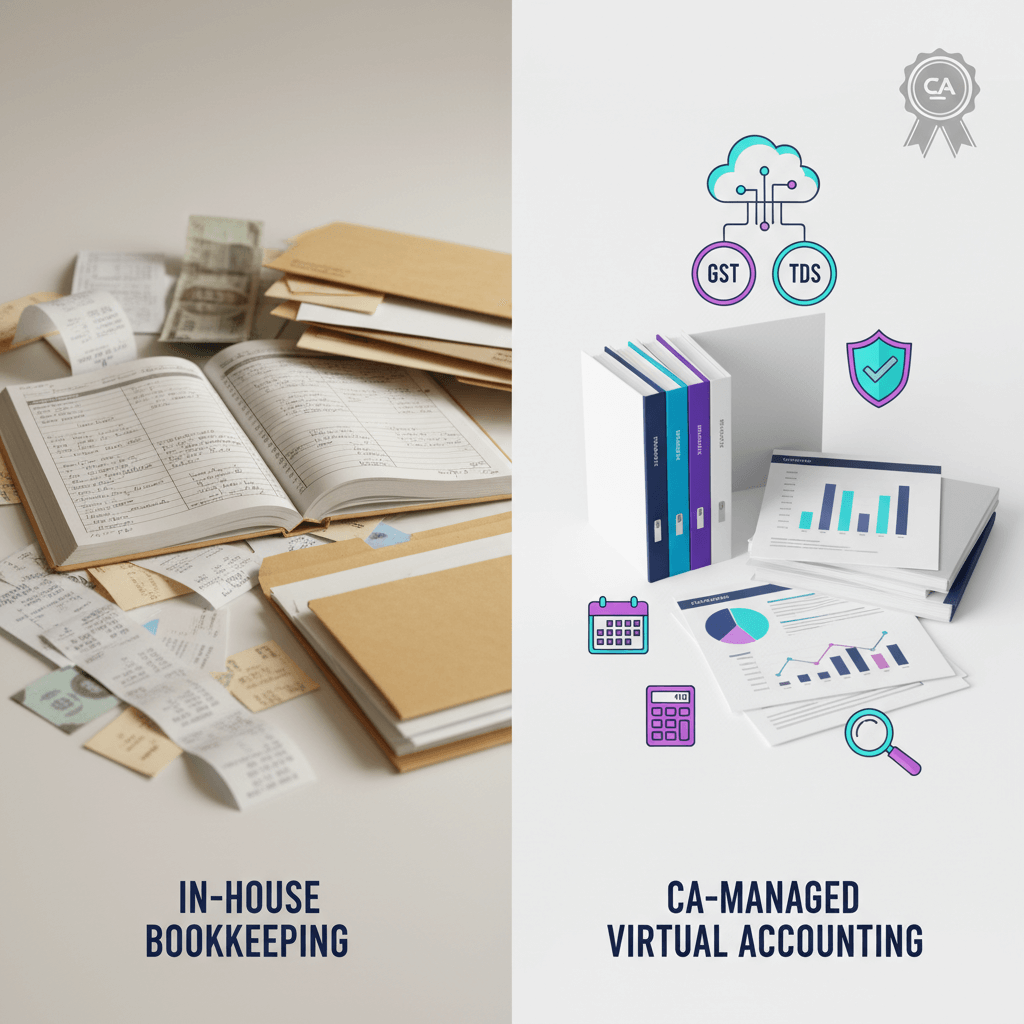Key takeaways
- Artificial intelligence transformation in CA firms drives operational efficiency and error reduction.
- Time savings from automated processes enable professionals to focus on high‐value advisory work.
- Real world case studies show measurable ROI and improved client satisfaction.
- Digital transformation is essential for maintaining competitiveness in a complex regulatory environment.
- Advanced analytics and fraud detection capabilities create new revenue opportunities.
Why CA Firm Digital Transformation Is Essential
The accounting profession is experiencing a revolutionary shift. Traditional accounting methods are becoming obsolete as CA firms embrace artificial intelligence to streamline operations, reduce errors, and deliver exceptional client value.
CA firm digital transformation is essential in today's environment of rising regulatory complexity and soaring client expectations. The pressure to deliver error free financial insights within tight deadlines has never been greater.
Digital transformation represents survival not just improvement. Firms that resist artificial intelligence adoption risk falling behind competitors who leverage automated solutions for accuracy, speed, and scalability. can ca firms survive in the age of ai.
Clients now demand real time insights, predictive analytics and strategic advisory services rather than just basic bookkeeping. In addition, young professionals expect modern tools. Embracing tools such as ai accountant vs human accountant and learning more about ai for accounting as well as the ultimate guide to ai in accounting finance 2025 empowers firms to transform and innovate.
Time Saved by Automation The Primary ROI Driver
One of the most immediate benefits of AI implementation is the dramatic reduction in time spent on routine tasks. Manual data entry, transaction reconciliation and invoice processing once drained countless hours from professional schedules.
With ai powered data entry 2025, tasks that once took hours are now completed in minutes. Machine learning algorithms intelligently extract data, apply correct coding and automate approvals.
This efficiency not only minimizes errors but it also frees up time for strategic analysis and advisory services. Learn more about emerging trends in the rise of vertical ai in accounting and how insights from accounting automation ai guide are reshaping the profession.
Real World AI Accountant Case Studies
Case Study 1 Invoice Processing Transformation
A midsized CA firm serving over 200 clients faced overwhelming invoice processing challenges. The team manually reviewed thousands of invoices each month, resulting in bottlenecks and increased errors.
The Challenge
Manual invoice processing consumed 40 percent of staff time and frequent data entry errors led to costly corrections and declining client satisfaction. The firm struggled to scale without hiring additional personnel. For further insights, see accounts payable automation in india a complete ai guide.
AI Implementation Strategy
An advanced AI powered invoice processing solution was deployed. The system automatically extracts invoice data, validates it against records and routes it for approval. Machine learning algorithms continuously learn from historical data to improve accuracy.
Measurable Outcomes
Processing time dropped by 75 percent and data entry errors were reduced by 90 percent. With 30 percent of staff time freed for advisory services, the firm was able to enhance its client relationships and premium service offerings.
Financial Impact
The firm achieved a full return on investment within nine months. Increased monthly processing capacity by 150 percent, improved client retention and attracted new business were among the many benefits realized.
Case Study 2 Advanced Fraud Detection Implementation
A regional accounting practice managing a substantial client portfolio faced rising fraud risks. Traditional manual reviews were proving inadequate to detect sophisticated fraudulent activities.
The Problem
Limited fraud detection capabilities resulted in missed patterns and increased financial losses. Manual spot checks were time consuming and incapable of comprehensive anomaly detection, thereby affecting client trust.
Technology Solution
The firm implemented a robust AI platform for real time transaction monitoring and anomaly detection. The system compared current data with historical metrics and known fraud indicators using machine learning algorithms.
Impressive Results
Within the first month, the AI system detected multiple fraudulent attempts. Audit efficiency improved by 35 percent through automated risk assessments and preliminary reviews.
Business Impact
Strengthened client trust, decreased insurance premiums and a smoother compliance process were direct benefits. The firm’s reputation improved and new business opportunities emerged.
Case Study 3 Predictive Financial Analytics Revolution
A growing CA firm was bogged down by outdated forecasting methods that resulted in reactive rather than proactive business insights. Manual financial analysis consumed weeks and delivered limited value.
Initial Challenges
Forecasting processes were labor intensive and provided only basic projections. This limited the firm's ability to offer strategic advisory services and led it to compete primarily on cost.
AI Integration Process
The firm integrated an advanced AI driven predictive analytics platform that processed complex datasets and modeled multiple scenarios simultaneously. The system delivered comprehensive forecasts and risk assessments within minutes.
Transformative Results
What took weeks was reduced to hours, saving 80 percent of forecasting time. Enhanced accuracy and proactive resource planning allowed the firm to stay ahead of market changes.
Revenue Growth
With premium advisory services and deeper client relationships, revenue per client increased and the firm attracted more sophisticated business. The market position shifted from price competition to value leadership. More details can be found in the ultimate guide to ai in accounting finance 2025.
Success Stories from CA Firms
Multiple CA firms report transformative impacts following artificial intelligence adoption. Enhanced operational efficiency, improved accuracy and faster turnaround times have redefined client service.
“Since implementing AI for accounts payable processing, we reduced processing times by 50 percent while achieving near zero error rates. Our team now focuses on advising clients rather than drowning in paperwork,” states a partner from a midsized CA firm.
Workflows once constrained by manual processes now operate seamlessly through intelligent automation. Staff are able to transition to client facing roles that generate higher margins and foster deeper relationships.
Before and After Comparison
Traditional ProcessAI Enhanced WorkflowMeasurable ImprovementManual data entry and validationAutomated extraction and intelligent coding70 percent time reduction, 90 percent fewer errorsReactive fraud detection with periodic reviewsReal time anomaly monitoring and alertsEarly warning capabilities and reduced financial lossesHistorical analysis with basic forecastingPredictive AI driven insights with scenario modellingMore accurate planning and proactive strategiesLimited client advisory capacityExpanded strategic consulting servicesHigher revenue per client and improved retention
Enhanced accuracy and faster turnaround times have also boosted client satisfaction and referral business.
Calculating ROI of AI Bookkeeping
CA firms must evaluate AI investments using metrics that capture both quantifiable benefits and strategic value creation. Direct cost savings emerge from reduced manual processing and lower error correction expenses.
Error reduction yields savings by eliminating costly rework and potential compliance penalties. AI systems often achieve accuracy improvements exceeding 90 percent compared to manual processes.
Audit efficiency gains reduce both external audit fees and internal preparation time. Automated documentation streamlines audit procedures, resulting in further savings.
Beyond tangible savings, enhanced client satisfaction can improve retention rates and drive referral business. In addition, staff satisfaction improves as repetitive tasks are automated, thereby reducing turnover costs.
A simple ROI calculation framework is:
ROI = (Time Savings + Cost Reductions + New Revenue – AI Investment) ÷ AI Investment
For more insights, visit benefits of ai in accounting 2025, read about how finance leaders can get roi from ai, or explore further at the rise of vertical ai in accounting and accounting automation ai guide.
Overcoming Digital Transformation Challenges
Successful digital transformation requires strategic planning and effective change management. Legacy system compatibility can pose challenges, so it is wise to start with pilot implementations on routine tasks.
Team members may be concerned about job security. Emphasize that AI eliminates time consuming manual tasks while opening opportunities for high value advisory roles. Comprehensive training and ongoing support are crucial during the transition.
When selecting a vendor, partner with those who have proven expertise in the accounting industry. Detailed demonstrations using actual data scenarios help build confidence and ensure the solution scales with future growth. Learn more from how finance leaders can get roi from ai and accounting automation ai guide.
Essential AI Tools for Modern CA Firms
Progressive CA firms leverage multiple AI solutions to maximize efficiency and client service capabilities.
Comprehensive AI Platforms
- AI Accountant – A complete artificial intelligence solution designed specifically for accounting professionals. It automates bookkeeping, financial analysis and delivers predictive insights to streamline operations.
- DataSnipper – An advanced audit automation platform that uses AI to extract and cross reference financial data from various documents.
- MindBridge AI – A sophisticated anomaly detection tool that automatically reviews financial transactions for errors and fraud.
- AppZen – An expense management and audit solution employing AI to review and approve expense reports with minimal human intervention.
- Inflo – A practice management platform that integrates AI to automate client communication, document management and workflow optimization.
Specialized Automation Tools
Invoice processing solutions automate data extraction, coding and approvals while integrating with existing accounting software. Financial forecasting platforms use machine learning to generate accurate future scenarios. Fraud detection systems monitor transactions continuously, flagging anomalies in real time. For further details, consult intelligent ledger mapping ai india.
Future of AI in Accounting Practice
The AI revolution in accounting is accelerating with emerging technologies that will further transform professional practice. Advancements in natural language processing are making conversational interfaces possible for financial reporting, while robotic process automation continues to evolve into complex decision making.
As accounting roles shift from data processing to strategic advisory, professionals will spend more time interpreting insights and serving clients. Smaller firms will gain access to sophisticated capabilities once reserved for large organizations. Early AI adoption will secure a competitive advantage in a market where technology evolves rapidly.
Preparation is key: evaluate current processes, invest in staff training and partner with proven AI vendors. The firms that embrace these changes today will lead the profession tomorrow.
Conclusion
These AI accountant case studies demonstrate the transformative power of artificial intelligence in modern accounting practice. Forward thinking CA firms are realizing measurable improvements in efficiency, accuracy and client satisfaction through strategic technology adoption.
The evidence supports immediate action. Firms that implement AI solutions gain competitive advantages while those delaying risk obsolescence. The return on investment from AI bookkeeping goes beyond cost savings by opening new revenue opportunities and strengthening client relationships.
Digital transformation is not a mere enhancement but an essential evolution. The future belongs to firms that successfully integrate human expertise with state of the art AI capabilities. Begin your AI journey today and let tools like AI Accountant guide you to new heights.
FAQ
How can an AI Accountant help reduce manual data entry in my CA firm?
An AI Accountant automates repetitive tasks such as data extraction, invoice coding and reconciliation. This reduces the time spent on manual entry and decreases the likelihood of errors. For example, many CA professionals have reported saving hours weekly by relying on AI Accountant to handle routine bookkeeping.
What are the measurable outcomes of implementing an AI Accountant?
Case studies show that implementing AI leads to up to 75 percent reduction in processing time and a 90 percent drop in data entry errors. CA firms using AI Accountant also reallocate resources to high value advisory work, contributing to increased revenue and client satisfaction.
How does an AI Accountant improve fraud detection in accounting processes?
An AI Accountant leverages machine learning algorithms to monitor transactions in real time. This sophisticated system identifies anomalies and potential fraudulent activities that might be overlooked during manual reviews. CA professionals using AI Accountant report enhanced detection and reduced financial risk.
Can an AI Accountant integrate with our existing accounting software?
Yes, many AI Accountant platforms are designed to integrate seamlessly with current accounting software. This integration minimizes workflow disruptions and allows for automated data transfer, enabling CA firms to modernize their processes without starting from scratch.
How will using an AI Accountant affect the roles of traditional accountants?
Rather than replacing human expertise, an AI Accountant automates repetitive tasks and frees professionals to focus on strategic analysis and advisory services. This transition allows traditional accountants to evolve into more value driven roles without compromising on accuracy.
Does an AI Accountant support real time financial forecasting?
Yes, advanced AI Accountants incorporate predictive analytics that quickly generate forecasts based on historical data and current trends. This means CA firms can prepare proactive strategies and better advise their clients.
How quickly can a CA firm expect a return on investment using an AI Accountant?
Many CA firms have realized a positive ROI within 6 to 12 months of implementing an AI Accountant. Time savings, error reduction and increased efficiency all contribute to rapid operational savings and revenue enhancements.
What considerations should be taken when selecting an AI Accountant solution?
It is crucial to evaluate integration capabilities, scalability and vendor support when selecting an AI Accountant solution. CA professionals should request demonstrations using real data and seek references from similar firms to ensure the tool meets specific operational needs.
How does an AI Accountant contribute to enhanced client satisfaction?
By dramatically reducing processing times and errors, an AI Accountant enables CA firms to deliver more timely and accurate financial insights. This operational excellence translates into improved client trust and long term satisfaction.
What role does AI Accountant play in the broader digital transformation of accounting practice?
AI Accountant is a cornerstone in the digital transformation of CA firms. It not only automates routine tasks but also provides predictive insights that support strategic decision making. By integrating AI Accountant into their processes, firms are better positioned to compete in a rapidly evolving market.
-01%201.svg)





